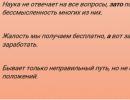The law on free cultivators of 1803 meant. Free tillers are a special class in Rus'. Decisions of the Russian Tsar
Decree on the release of the landowners of their peasants
upon conclusion of terms based on mutual agreement
His decree Imperial Majesty All-Russian autocrat from the Governing Senate.
According to the personal decree of His Imperial Majesty, given to the Governing Senate last February on the 20th day, signed by His Majesty in his own hand, which depicts:
Acting Privy Councilor Count Sergei Rumyantsev, having expressed a desire for some of his serfs, upon their dismissal, to approve ownership of plots of land belonging to him by sale or on other voluntary terms, he asked that such conditions, voluntarily concluded, have the same legal effect and force as other serf obligations were assigned, and so that the peasants, thus dismissed, could remain in the state of free farmers, without being obliged to enter into another kind of life.
Finding, on the one hand, that by the force of existing laws, such as: according to the manifesto of 1775 and the decree of December 12, 1801, the dismissal of peasants and the ownership of land by those dismissed is allowed, and on the other hand, that such approval of land as ownership can in many cases to provide landowners with various benefits and have a useful effect on encouraging agriculture and other parts of the state economy, we consider it fair and useful both for him, Count Rumyantsev, and for all those landowners who wish to follow his example, to allow such an order; and in order for it to have legal force, we find it necessary to decide the following:
1) If any of the landowners wishes to release their well-acquired or family peasants, individually or as a whole village, to freedom and at the same time approve for them a plot of land or a whole dacha, then making conditions with them that are recognized by mutual agreement as the best, he has to present them at the request his through the provincial noble leader to the Minister of Internal Affairs for consideration and submission to us; and if a decision follows from us in accordance with his wishes: then these conditions will be presented in the Civil Chamber and will be recorded with the serfs with the payment of legal duties.
2) Such conditions, made by the landowner with his peasants and recorded in the serf deeds, are preserved as serf obligations sacredly and inviolably. Upon the death of the landowner, his legal heir, or heirs, enters into all the duties and rights indicated in these conditions.
3) In the event of a penalty on one or the other side, in these conditions, the public offices sort out complaints and impose penalties according to general laws on contracts and fortresses with the observation that if a peasant or an entire village does not fulfill its obligations: then it is returned to the landowner with the land and his family is still in possession.
4) Peasants and villages, released from the landowners under such conditions with the land, if they do not wish to enter other states, can remain on their own lands as farmers and in themselves constitute a special state of free cultivators.
5) Household people and peasants, who were previously freed personally with the obligation to choose a type of life, can, within the period prescribed by laws, enter into this state of free farmers if they acquire land as their own. This also applies to those of them who are already in other states and wish to move into agriculture, accepting all the responsibilities of it.
6) Peasants who have been freed by the landowners and who own the land in their own right, pay a per capita government salary on a par with the landowners, pay conscription duties in kind and, while correcting zemstvo duties on an equal basis with other government peasants, do not pay quitrent money.
7) They are subject to trial and execution in the same places as state-owned peasants; As for their possessions, they sort them out into fortresses, like owners of real estate.
8) As soon as the conditions are fulfilled, the peasants receive the land into ownership, they will have the right to sell it, mortgage it and leave it as an inheritance, without however splitting up plots of less than 8 dessiatines, they also have the right to buy land again, and therefore move from one province to another, but not otherwise than with the knowledge of the Treasury Chamber for the transfer of their capitation salary and recruitment duty.
9) Since such peasants have real estate, they can enter into any obligations, and the decrees of 1761 and 1765, prohibiting peasants from entering into conditions without the permission of their superiors, do not apply to them.
10) If the peasants released by the landowner with the land were in a state or private mortgage, they can, with the permission of the state authorities and with the consent of private creditors, assume the debt lying on the estate, enter it into the conditions, and in collecting this debt, which they have assumed, to treat them as landowners.
On this basis, the Governing Senate will not leave all the necessary orders in place.
Count Viktor Kochubey, Minister of Internal Affairs, countersigned.
The Governing Senate ordered: for information and in due course, in accordance with this highest order of His Imperial Majesty, to order execution by decrees to gentlemen ministers, military governors, public places, provincial boards, state and civil chambers; and report information to the Holy Governing Synod and the Moscow Senate departments.
March 4 days 1803
On February 20, 1803, a law was issued on the so-called “free cultivators”. This law owes its origin to the private initiative of gr. S.P. Rumyantsev, son of the famous Field Marshal Catherine II. Rumyantsev, wanting to free 199 souls with land from among his patrimonial peasants, presented to the sovereign in November 1802 a note with draft rules on the basis of which landowners could liberate entire villages, approving plots of land for an individual peasant or for the entire society on the terms, " agreeing with state legislation and mutual benefit."
Great Reform. Russian society and the peasant question in the past and present. Ed. t-va I.D. Sytin. Volume 2. P.82.
Free cultivators are peasants freed from serfdom and set free with lands that have therefore become their real property. They are free to change their way of life, engage in crafts and fit into either the philistinism or the merchant class. This is still a nascent class in Russia. Its appearance and multiplication will serve as true evidence of the increase in the people's wealth and people's education. He is the forerunner of the future universal independence of the peasants.
Outline of statistics of the Russian State, compiled by the main pedagogical institute Associate Professor Konstantin Arsenyev. Part 2. SPb., Type. Imperial Orphanage. 1819. P. 75.
On the release by the landowner of his peasants to freedom upon the conclusion of conditions based on mutual consent
Acting Privy Councilor Count Sergei Rumyantsov, having expressed a desire for some of his serfs, upon their dismissal, to approve ownership of plots of land belonging to him by sale or on other voluntary terms, asked that such conditions, voluntarily concluded, have the same legal effect and force as other serf obligations were assigned, and so that the peasants, thus dismissed, could remain in the state of free farmers, without being obliged to enter into another kind of life.
Finding, on the one hand, that by the force of existing laws, such as, according to the Manifesto of 1775 and the decree of December 12, 1801, the dismissal of peasants and the ownership of land by the dismissed is permitted; and on the other hand, that such confirmation of land ownership can in many cases provide landowners with various benefits and have a useful effect on encouraging agriculture and other parts of the state economy, we consider fair and useful both to him, Count Rumyantsev, and to all of the landownersif he wishes to follow his example, such an order will be allowed; and in order for it to have its legal force, we find it necessary to decide the following.
1) If any of the landowners wishes to release their well-acquired or family peasants, individually or as a whole village, to freedom and at the same time approve for them a plot of land or a whole dacha, then making conditions with them that are recognized by mutual agreement as the best, he has to present them at the request his through the provincial noble leader to the Minister of Internal Affairs for consideration and submission to us; and if a decision follows from us in accordance with his wishes: then these conditions will be presented in the Civil Chamber and will be recorded with the serfs with the payment of legal duties.
2) Such conditions, made by the landowner with his peasants and recorded in the serf deeds, are preserved as serf obligations sacredly and inviolably. Upon the death of the landowner, his legal heir, or heirs, assumes all duties and rights, includingthese conditions indicated.
3) In the event of a penalty on one or the other side, in these conditions, the public places, based on complaints, sort out and impose penalties according to general laws on contracts and fortresses with the following observation: if a peasant or an entire village does not fulfillof its obligations: then it is returned to the landowner with the land and his family in possession as before.
4) Peasants and villages, released from the landowners under such conditions with the land, if they do not wish to enter other states, can remain on their own lands as farmers and in themselves constitute a special state of free cultivators.
5) Household people and peasants, who were previously freed personally with the obligation to choose a type of life, can, within the period prescribed by laws, enter into this state of free farmers if they acquire land as their own. ThisIt also applies to those of them who are already in other states and wish to move into agriculture, taking on all the responsibilities of it.
6) Peasants who have been freed by the landowners and who own the land as their own, pay a per capita government salary on an equal basis with the landowners, pay conscription in kind and, along with other government-owned peasants, correct the zemstvoduties and quitrent money are not paid.
7) They are subject to trial and execution in the same places as state-owned peasants; As for their possessions, they sort them out into fortresses, like owners of real estate.
8) As soon as the conditions are fulfilled, the peasants receive the land into ownership, they will have the right to sell it, mortgage it and leave it as an inheritance, without, however, breaking up plots of less than 8 dessiatines, and they also have the right to buy againland, and therefore move from one province to another, but not otherwise than with the knowledge of the Treasury Chamber for the transfer of their capitation salary and recruitment duty.
9) Since such peasants have real estate, they can enter into any obligations, and the decrees of 1761 and 1765, prohibiting peasants from entering into conditions without the permission of their superiors, do not apply to them.
10) If the peasants, who were released by the landowner with the land, were in a state or private mortgage, they can, with the permission of the state authorities and with the consent of private creditors, assume the debt lying on the estate and pay it intoconditions, and in collecting this debt, assumed by them, to treat them as landowners.
On this basis, the Governing Senate will not leave itself to make all the necessary orders.
PSZRI. T. 27. pp. 462-463.
The Law on Free Plowmen in Russia is a law dated February 20, 1803, according to which landowners received the right to free serfs individually and in villages, with a mandatory allotment of land.
The Law on Free Plowmen in Russia is a law dated February 20, 1803, according to which landowners received the right to free serfs individually and in villages, with a mandatory allotment of land. For their will, the peasants paid a ransom or performed duties. If obligations were not fulfilled, the peasants returned to the landowner. The peasants who received their freedom in this way were called free or free cultivators; from 1848 they began to be called state peasants.
Acting Privy Councilor Count Sergei Rumyantsev, having expressed a desire for some of his serfs, upon their dismissal, to approve ownership of plots of land belonging to him by sale or on other voluntary terms, asked that such conditions, voluntarily concluded, have the same legal effect and force as other serf obligations were assigned, and so that the peasants, thus dismissed, could remain in the state of free farmers, without being obliged to enter into another kind of life.
Finding, on the one hand, that by the force of existing laws, such as the manifesto of 1775 and the decree of December 12, 1801, the dismissal of peasants and the ownership of land by the dismissed are permitted; and on the other hand, that such confirmation of land ownership can in many cases provide landowners with various benefits and have a useful effect on encouraging agriculture and other parts of the state economy: we consider it fair and useful, both for Count Rumyantsev and for all those landowners to follow if he wishes to follow his example, such an order will be permitted; and in order for it to have its legal force, we find it necessary to decide the following.
1) If any of the landowners wishes to release their acquired or family peasants individually, or as a whole village, to freedom, and at the same time approve for them a plot of land or an entire dacha; then having made conditions with them that are recognized by mutual agreement as the best, he has to submit them at his request through the provincial noble leader to the Minister of the Interior for consideration and presentation to us; and if a decision follows from us in accordance with his wishes: then these conditions will be presented in the Civil Chamber and will be recorded with the serfs with the payment of legal duties.
2) Such conditions, made by the landowner, with his peasants and recorded among the serfs, are preserved as serf obligations sacredly and inviolably. Upon the death of the landowner, his legal heir, or heirs, enter into all the duties and rights indicated in these conditions.
3) In the event of a penalty on one or the other side, under these conditions, the public offices sort out complaints and impose penalties according to general laws on contracts and fortresses, with the following observation: if a peasant, or an entire village, does not fulfill its obligations: then returned to the landowner with the land and his family into possession as before. 4) Peasants and villages released from landowners under such conditions, if they do not wish to enter other states, can remain on their own lands as farmers and in themselves constitute a special state of free cultivators.
5) Household people and peasants, who were previously freed personally with the obligation to choose a type of life, can, within the period prescribed by laws, enter into this state of free farmers if they acquire land as their own. This also applies to those of them who are already in other states and wish to move into agriculture, accepting all the responsibilities of it.
6) Peasants who have been freed by the landowners and who own land in their own right, pay a per capita government salary on an equal basis with the landowners, pay conscription duties in kind, and while correcting zemstvo duties on an equal basis with other government peasants, they do not pay quitrent money to the treasury.
7) They are subject to trial and execution in the same places as state-owned peasants; As for land ownership, they sort it out into fortresses, like owners of real estate.
8) As soon as the conditions are fulfilled, the peasants receive the land into ownership: they will have the right to sell it, mortgage it and leave it as an inheritance, without however splitting up plots of less than 8 acres; they equally have the right to buy land again; and therefore move from one province to another; but not otherwise than with the knowledge of the Treasury Chamber for the transfer of their capitation salary and recruitment duty.
9) Since such peasants have real estate, they can enter into all sorts of obligations; and the decrees of 1761 and 1765, prohibiting peasants from entering into conditions without the permission of their superiors, do not apply to them.
10) In the event that the peasants, who were released by the landowner with the land, were in state or private collateral: they can, with the permission of the state authorities and with the consent of private creditors, assume the debt lying on the estate, enter it into the conditions; and in collecting this debt, which they assume, to treat them as landowners.
On this basis, the Governing Senate will not leave itself to make all the necessary orders.
PSZ, since 1649. T. XXVII. 1802-1803. St. Petersburg, 1830 pp. 462-463, N 20620.
The decree on free cultivators of 1803 became the first decree from the autocratic government, which would seek to free the peasants from the dependence of the landowners. Historians evaluate the decree itself differently. Basically, there is an opinion that the document was of a purely formal nature, and the number of peasants released under it was very insignificant. The decree was only a measure for the landowners to receive benefits as a ransom from the peasants for freedom.
However, the decree on the establishment of “free cultivators” is an important step towards the liberation of peasants from serfdom, and the document also became the basis for the reform in 1861.
Prerequisites for the introduction of the decree on the establishment of free cultivators

It is worth noting that from the beginning of his reign the emperor had grandiose plans for resolving the peasant issue. In this direction, he wanted to carry out serious reforms, maybe even up to the abolition of serfdom.
But, as you know, Russian Emperor cannot resolve such issues in an instant, although he has full power. The entire impulse of the young emperor to solve this problem was defeated by the resistance of the nobles and officials, who openly or not so openly protested against changing this order.
The situation of the peasants early XIX V. it was depressing. Corvée and quitrent were practically not controlled by the state. Yes, earlier the emperor introduced a decree “on the Three-Day Corvee,” but it did not work in practice. The landowners still continued to abuse their power over the peasants. Many peasants, in principle, would be glad to leave the landowner, but they did not have such an opportunity.
Back in 1802, his actual privy advisor, Count S.P., contacted him. Rumyantsev. He provided a project according to which the peasants had to be given freedom, but only their freedom they had to purchase with money. That is, this legislative act was a plus for both landowners and peasants. The project was considered by the Permanent Council (not!) in January 1803. Over the course of several weeks, amendments were made to it, on February 9, the project was approved, and on February 20, 1803, Alexander signed the decree and it came into force.
The essence of the decree on free cultivators
 The essence and content of the decree on free cultivators was presented in the form of a preamble and several articles. It is noteworthy that already in the preamble it is clear for whom this decree was created. They tried to present this law not as a mercy for the peasants, but primarily as a new privilege for landowners. Although it is clear that, according to the decree, the peasant had real opportunity leave the landowner with the land.
The essence and content of the decree on free cultivators was presented in the form of a preamble and several articles. It is noteworthy that already in the preamble it is clear for whom this decree was created. They tried to present this law not as a mercy for the peasants, but primarily as a new privilege for landowners. Although it is clear that, according to the decree, the peasant had real opportunity leave the landowner with the land.
Let's do some analysis of several important articles of the decree:
- Article 1.
The landowner has the right! (not an obligation) to free your peasant if both the landowner and the peasant agree.
The landowner could release the peasant alone, with his family, or even free the entire village, but always with the land. But the size of the plot was not discussed, the main thing was not less than 8 acres (the norm of that time for the existence of a peasant farm);
- Article 2.
Here we have an innovation in Russian law of that period. This article stated that the agreement between the landowner and the peasant is unshakable. This means that the heirs who take over the rights should not challenge the agreement on the release of the peasant. But in reality everything was different; there are many controversial cases on this issue.
- Article 3.
Here the fate of the peasant was described in vivid colors if he left the landowner, but did not fulfill the agreement. If he does not pay, say, a certain amount under the terms of the agreement, then he returns to the state of a serf along with his family.
- Articles 4-9.
This article describes the status of “free tillers”. These included categories of tax-paying population who were released and subsequently bought land as their own.
That is, the farmers had real estate, which means that they were now subject to laws regarding this real estate and they had to fulfill certain obligations. This means that they were now full citizens of their state. They could sell, donate, inherit, or mortgage their land.

In conclusion, I would like to note that the legal value of this decree in resolving the peasant issue is high. This is certain. But the decree itself was constantly changing after February 20, 1803; as it was implemented, more than two dozen corrections and additions were made, and some of its provisions were revised more than once. For most of the serfs, this decree did not become a “magic pill.” Yes, there were those who gave the ransom and left, but there were few of them. The entire process and conditions in the emancipation agreement were controlled by the landowners, and they were in no hurry to prescribe adequate conditions feasible for the peasant. Moreover, the decree was not binding, it was only a recommendation.
Decree on free cultivators adopted in 1803. Video
The more a person is able to respond to the historical and universal, the broader his nature, the richer his life and the more capable such a person is of progress and development.
F. M. Dostoevsky
The decree on free cultivators was signed on February 20, 1803 by Emperor Alexander the First. The essence of this decree was to create conditions under which the landowner could free his peasants by allocating them with land. This was not done for free, but for a ransom. Of course, this did not lead to the mass liberation of the peasants, but for the first time in Russia, at the legislative level, an attempt was made to endow the peasants with rights and provide them with land. Subsequently, it was this decree that became the basis for the reform of 1861.
Preconditions for the reform
At the beginning of the 19th century in Russia there was a very acute peasant question. The peasants were completely dependent on their landowner, working most of the time in his field. At the same time, some peasants periodically expressed a desire not just to leave the landowners by buying their freedom. But this was impossible due to the current legislation. Count Sergei Rumyantsev was one of the first to understand this problem. This was an advisor to the emperor who said that peasants could be given freedom, but only for money.
Why did it become possible for a similar decree to appear in Russia? There were several reasons for this:
- Spread of the money economy. Money played an increasingly important role, and landowners began to seriously consider the situation of granting freedom to their peasants, but only for a ransom.
- Discontent among the population. The peasants more and more began to show their dissatisfaction with the authorities, which for years could not resolve the peasant issue.
- Reduced efficiency of landowners' farms. The serfs worked in the master's fields without proper enthusiasm. In fact, every serf was not interested in the result of his own labor.
- Urban population growth. All larger number people were eager to leave the village and move to the city.
The essence of the decree
On February 20, 1803, a decree was issued on the landowners' release of their peasants upon the conclusion of conditions based on mutual consent. This is exactly what this document was officially called. It contained the following provisions:
- The landowner was given the right to provide his peasants with freedom and land for money. Landowners set their own price for purchasing land.
- The terms of this decree were also used by the heirs of the persons who signed it.
- The peasant was obliged to pay the landowner the full amount that was established by him. If this amount was not paid, the peasant again became a serf.
- Free and free peasants were required to carry out conscription duties to serve in the army.

The peasants, whom the landowner granted freedom in accordance with this decree, began to be called nothing more than free or free cultivators. This is where the popular name for the decree of 1803 came from.
The results of the decree on free cultivators can hardly be called satisfactory. The decree lasted from 1803 to 1861. For 58 years, only one and a half percent of peasants received the right to buy their freedom. It was 150 thousand men with their families. In fact, the state created a situation in which everyone could become free, but the conditions of this freedom were acceptable only for a few.
Consequences of the law
The decree on free cultivators in its essence did not have any serious significance for the majority of the serfs. After all, the purchase of land was completely controlled by the landowner. He determined both the size of the land plot and its position and value. Very often, landowners offered barren land to the serfs for ransom, or set an unaffordable ransom amount. Moreover, men who bought the land were subject to conscription into the army. Largely because of this, the peasants themselves did not strive much for their own freedom. It should also be noted that the implementation of the decree left much to be desired. Many landowners granted freedom to peasants only on the basis that the latter were obliged not only to buy back their freedom, but also to bear the duties of ordinary serfs (corvée and quitrent).
Those peasants who bought their freedom and were not suitable for military service were called free tillers, but they bore all duties only in favor of Russia.
The reasons why the decree on free cultivators did not have the desired impact lies in the fact that the decrees were purely advisory in nature. The landowner was not obliged to sell the land, and even if the peasant had money and asked to be freed, the landowner could refuse without any consequences.
An interesting fact is that Alexander 1 personally showed interest in the implementation of this decree. To do this, he demanded that he be provided with an annual report on the serfs who became free.
Literature
- History of Russia 19th century. P.N. Zyryanov. Moscow, 1999 "Enlightenment".
- Historical Dictionary 2nd edition. Orlov, Georgiev, Georgieva. Moscow, 2012.






